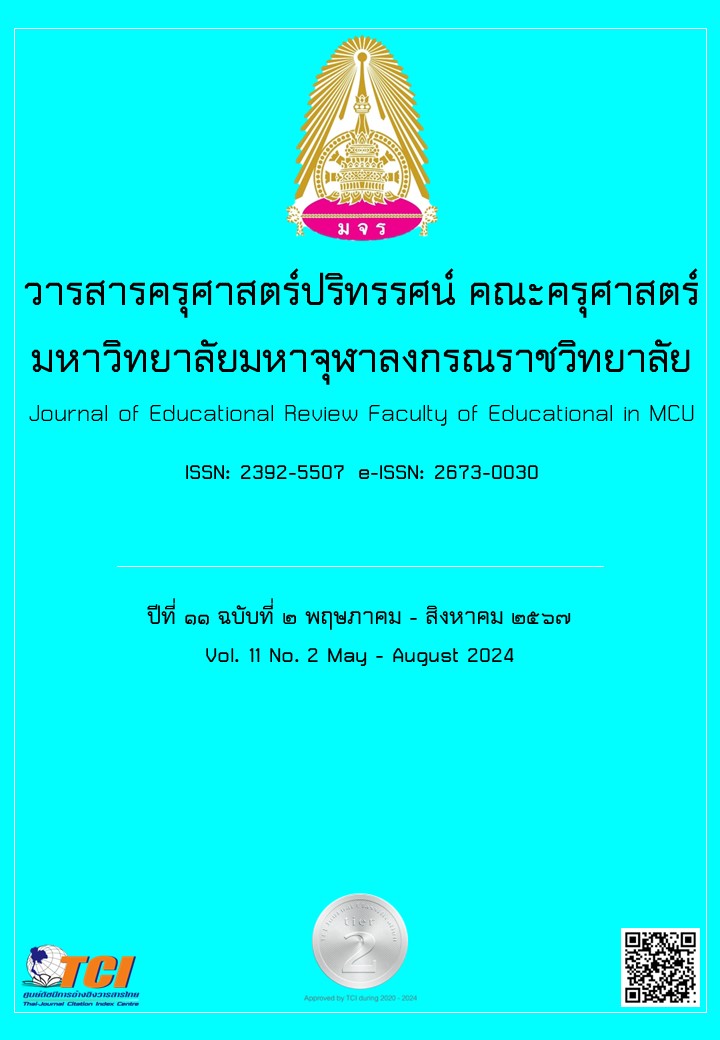PROJECT - BASED EDUCATION MANAGEMENT MODEL BASED ON IDDHIPADA PRINCIPLES OF ANGTHONG VOCATIONAL EDUCATION INSTITUTE UNDER THE OFFICE OF THE VOCATIONAL EDUCATION COMMISSION
Main Article Content
Abstract
This research article aimed to propose a model of project-based education based on the principle of the Four Iddhipda of vocational educational institutions in Ang Thong Province, under the Office of the Vocational Education Commission. This research was a mixed-method research with 3 research steps as following: Step 1: quantitative research using a questionnaire with a sample of 165 teachers. Step 2: qualitative research by interviewing 6 key informants and group discussions with 9 experts using purposive selection. Step 3: model evaluation by using an evaluation form with a sample of 165 teachers of vocational educational institutions in Ang Thong Province, under the Office of the Vocational Education Commission. Data were analyzed using statistics including frequency, percentage, mean, and standard deviation. The research results revealed that the model of project-based education based on the principle of the Four Iddhipda of vocational educational institutions in Ang Thong Province, under the Office of the Vocational Education Commission, had 4 components: 1) principle, 2) objective, 3) integration of project-based education based on the principle of the Four Iddhipda, and 4) 7 aspects of application, namely planning and goal setting, project creation, the introduction of project management systems, supporting and personnel development, cooperation building, measurement and evaluation, promotion and dissemination, and the results of format evaluations were all at the highest level overall. When considering each aspect, it was found that the evaluation results were at the highest level in all 4 aspects: usefulness, feasibility, appropriateness, and correctness, respectively. It was summarized as the research knowledge, namely 3PIC.
Article Details

This work is licensed under a Creative Commons Attribution-NonCommercial-NoDerivatives 4.0 International License.
ทัศนะและความคิดเห็นที่ปรากฏในบทความในวารสารฉบับนี้ถือเป็นความรับผิดชอบของผู้เขียนบทความนั้นเพียงผู้เดียว และไม่ถือเป็นทัศนะและความรับผิดชอบของกองบรรณาธิการ
กองบรรณาธิการขอสงวนสิทธิ์ในการคัดเลือกบทความลงตีพิมพ์และจะแจ้งให้เจ้าของบทความทราบหลังจากผู้ประเมินบทความตรวจอ่านบทความแล้ว
ต้นฉบับที่ได้รับการตีพิมพ์ในวารสารครุศาสตร์ปริทรรศน์ คณะครุศาสตร์ มหาวิทยาลัยมหาจุฬาลงกรณราชวิทยาลัย ถือเป็นกรรมสิทธิ์ของคณะครุศาสตร์ มหาวิทยาลัยมหาจุฬาลงกรณราชวิทยาลัย ห้ามนำข้อความทั้งหมดหรือบางส่วนไปพิมพ์ซ้ำ เว้นเสียแต่ว่าจะได้รับอนุญาตจากมหาวิทยาลัยฯ เป็นลายลักษณ์อักษร
References
กระทรวงศึกษาธิการ. (2546). พระราชบัญญัติการศึกษาแห่งชาติ พ.ศ. 2542. กรุงเทพมหานคร: โรงพิมพ์คุรุสภาลาดพร้าว.
กระทรวงศึกษาธิการ. (2562). พระราชบัญญัติการศึกษาแห่งชาติ (ฉบับที่ 4) พ.ศ. 2562. กรุงเทพมหานคร: โรงพิมพ์คุรุสภาลาดพร้าว.
กุลยา ต้นติผลาชีวะ. (2551). การจัดกิจกรรมการเรียนรู้สำหรับเด็กปฐมวัย. กรุงเทพมหานคร: โรงพิมพ์มิตรสัมพันธ์กราฟฟิค.
คาสทูล ทูลลิ้ง ซิสเต็ม (Castool Tooling Systems). (2566). อิทธิบาท 4 กับแนวทางการทำงานให้ประสบผลสำเร็จ. แหล่งที่มา https://shorturl.asia/sOTwW สืบค้นเมื่อ 15 ก.พ. 2566.
จารึก อะยะวงศ์. (2560). การศึกษาไทย : ปัญหาอยู่ที่ไหนกันแน่. กรุงเทพมหานคร: สำนักพิมพ์มติชน.
เตือนใจ รักษาพงศ์. (2551). การพัฒนารูปแบบการจัดการความรู้เพื่อการบริหารงานวิชาการของสถานศึกษาขั้นพื้นฐานด้วยกระบวนการวิจัยเชิงปฏิบัติการแบบมีส่วนร่วม. ดุษฎีนิพนธ์การศึกษาดุษฎีบัณฑิต. มหาวิทยาลัยบูรพา.
นันทิยา ชัยชนะเลิศ. (2561). รายงานการจัดประสบการณ์แบบโครงการ (Project Approach) ควบคู่สารนิทัศน์ โดยใช้บริบทเป็นฐาน เพื่อพัฒนาทักษะกระบวนการทางวิทยาศาสตร์ของเด็กปฐมวัย ชั้นอนุบาลปีที่ 3 โรงเรียนบ้านรวมมิตร. รายงานวิจัย. สำนักงานเขตพื้นที่การศึกษาประถมศึกษาเชียงราย เขต 1 สำนักงานคณะกรรมการการศึกษาขั้นพื้นฐาน กระทรวงศึกษาธิการ.
ประจวบ หนูเลี่ยง. (2558). การพัฒนารูปแบบการจัดการศึกษาแบบมีส่วนร่วมของจังหวัดพัทลุง. ดุษฎีนิพนธ์ปรัชญาดุษฎีบัณฑิต. มหาวิทยาลัยเวสเทิร์น.
พระธรรมปิฎก (ป. อ. ปยุตโต). (2538). พจนานุกรมพุทธศาสตร์ฉบับประมวลธรรม. กรุงเทพมหานคร: มหาจุฬาลงกรณ์ราชวิทยาลัย.
มหาจุฬาลงกรณราชวิทยาลัย. (2539). พระไตรปิฎกภาษาไทย ฉบับมหาจุฬาลงกรณราชวิทยาลัย. กรุงเทพมหานคร: มหาจุฬาลงกรณราชวิทยาลัย.
รุจิราพร รามศีริ. (2556). การพัฒนารูปแบบการเรียนการสอนวิทยาศาสตร์โดยใช้การวิจัย เป็นฐานเพื่อเสริมสร้างทักษะการวิจัย ทักษะการแก้ปัญหาอย่างสร้างสรรค์และ จิตวิทยาศาสตร์ของนักเรียนระดับมัธยมศึกษา. ดุษฎีนิพนธ์ปริญญาปรัชญาดุษฎีบัณฑิต. มหาวิทยาลัยศิลปากร.
วัฒนา มัคคสมัน. (2554). การสอนแบบโครงการ. พิมพ์ครั้งที่ 3. กรุงเทพมหานคร: วี.พริ้นท์.
อรวิภา จรุญจารุวัฒนา. (2559). การบูรณาการหลักอิทธิบาท 4 กับการเรียนการสอนของศูนย์การศึกษานอกระบบและการศึกษาตามอัธยาศัย ตำบลหายยา อำเภอเมือง จังหวัดเชียงใหม่. ดุษฎีนิพนธ์พุทธศาสตรดุษฎีบัณฑิต. มหาวิทยาลัยมหาจุฬาลงกรณราชวิทยาลัย วิทยาเขตเชียงใหม่.
Burr S.N. (2002). Collaboration, Reflection and Self-Assessment to Promote Curricular Change in Early Childhood Education. Dissertation Abstracts International.
Butler, Alison, & Monica Christofili. (2014). Project-Based Learning Communities In Developmental Education: A Case Study Of Lessons Learned. Community College Journal Of Research And Practice. 38(7). 638-650.
Katz, L.G. & Chard, S.C. (1994). Engaging children’s mind: The project approach. 10thed. Norwood. New Jersey: Ablex.
Ortiz, B.L. (2006). Online collaborative problem-based learning: design, facilitation, student work strategies and supporting technologies. Doctoral dissertation. Columbia University.


